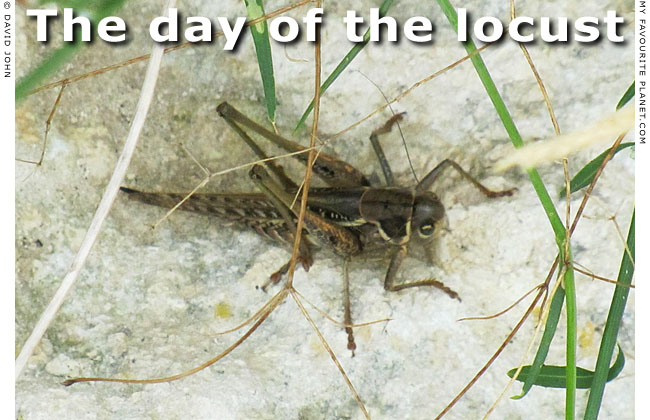|
|
 |
| My Favourite Planet > Blogs > Edwin Drood's Column > March 2011 |
 |
 |
back |
Edwin Drood's Column |
 |
8 March 2011 |
 |
| |
 |
 |
In which Edwin looks at frenzied activity in animals and asks whether there is not an advantage
to such behaviour in evolutionary terms, and thus whether it does not offer some clues
that might aid us in understanding human mass-hysterical phenomena.
 |
The frenzy or bloodlust is typical of many predators. If there is an unusual density of prey in one place, particularly if there is little chance of them escaping, most predators will kill beyond all possible nutritional need. Big cats will kill far more antelope or wildebeest than they can reasonably carry off and eat, a fox will kill any amount of chickens. Such activity may seem counterproductive, as the animal is removing its own food source without further valorisation. Yet a military strategist might see this as an instinctive version of the scorched earth tactic: that which I can destroy, my enemy (other group or competitor species) cannot benefit from. In the long term, the survival of my own group or species will be more secure, even if food stocks for some time thereafter are diminished.
 Of course, to the outside eye, frenzy does not present itself as reasonable strategy. It looks like a killing unit doing the thing it does best in ideal circumstances and enjoying it a great deal. It also looks like a waste of life and protein. It looks like a wanton and senseless massacre. But if the predator is small and hunts in a really large pack (the feeding-frenzy of piranha fish or the gorging of fruit-bats are good examples) then this behaviour is clearly advantageous, insofar as all the energy of the group is concentrated on the single aim of defeating and/or consuming.
 Smaller creatures have to eat their own body weight far more frequently than bigger ones, which makes the “group kill” and its attendant frenzied and compulsive behaviour an efficient way of ensuring this whenever the situation is apposite and without any distractions. And for many small creatures, particularly for insects, the frenzied state brings other aspects of mass behaviour with it. A swarm of locusts is not a normal thing, locusts swarm in exceptional conditions, but once they do their progress is unstoppable. The otherwise docile, even solitary critter becomes a mindless zombie in the great armada. In turn they are the prey of frenzied flocks of birds, intent on gulping down as many locusts as possible, even until they can no longer fly. |
| Genetics and the moral imperative |
There is a type of hunting spider – one of those that stalk and jump on their prey, rather than waiting for them to buzz into a web or fall into a trap – which feeds entirely on malaria mosquitoes. In the right circumstances it can kill hundreds in a single night. However, since it prefers blood-engorged mosquitoes, it reduces the number of females who have already been possible transmitters rather than taking out the insect which is about to feed on you. It is the “morning after” pill of the war on malaria, not a big hitter, but useful. Interestingly it is attracted to the smell of sweaty socks, as that is where the food will be! Sweaty socks get it all excited. Possible moral of the story: either wash your socks and use a net or live dangerously and learn to overcome your arachnophobia.
 The reason why this subject interests me is because we share well over 90% of our genetic patrimony with all these creatures. So we may very well have our own version of the feeding-frenzy gene, which may even have once had a use in certain exceptional circumstances now alien to our modern world. If this is so, while helping to explain yellow journalism and paparazzi, stampedes at football matches, Khomeini’s funeral, hysterical mass grieving for Princess Diana, the absurd popularity of boy bands, doughnut and hot-dog competitions, the tattooed masses who follow catch wrestling, the hoarding instincts of January sales addicts etc., it may also offer insights into lynch mobs, mass looting, multiple suicides, shooting sprees, massacres and wartime atrocities. Nazi Germany or Pol Pot’s Cambodia could be test cases for our genetic frailty and not just for our willingness to be mentally manipulated. From an anthropological point of view, it may take more than a little will power and discipline NOT to hack your neighbour into mincemeat when all those around you are doing just that. In other words: there, but for the grace of God, go you or I my friend.
© Edwin Drood, March 2011
Illustration: photo by © David John |
|
Edwin Drood's Column, the blog by The Mysterious Edwin Drood,

at My Favourite Planet Blogs.
We welcome all considerate responses to this article
and all other blogs on My Favourite Planet.
Please get in contact. |
 |
Visit the My Favourite Planet Group on Facebook.

Join the group, write a message or comment,
post photos and videos, start a discussion... |
|
Views of blog authors do not necessarily reflect those of the publishers
or anyone else at, on or in the vicinity of My Favourite Planet. |
 |
 |
|
|
| |
| |
|
| |
 |
| |
 |
| |
 |
| |

George Alvanos

rooms
in Kavala's historic Panagia District

Anthemiou 35,
Kavala, Greece

kavalarooms.gr
 |
| |

Olive Garden Restaurant

Kastellorizo, Greece

+30 22460 49 109

kastellorizo.de
 |
| |

Papoutsis
Travel Agency

Kastellorizo, Greece

+30 22460 49 286

greeklodgings.gr
 |
| |
|